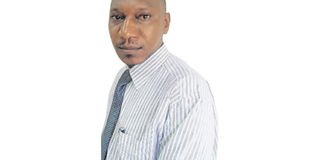My Kiswahili lecturer wrote me off as a hopeless case

Enock Matundura who is currently undertaking the translation of the late Barbara Kimenye’s Moses series books for Oxford University Press. PHOTO/COURTESY
What you need to know:
- I chose to deconstruct Utenzi wa Liyongo (The Epic of Liyongo) by Muhammed Kijumwa, written in archaic Kiswahili, into a novella titled Mkasa wa Shujaa Liyongo now in its seventh reprint.
- Perhaps one of the most challenging projects I am currently undertaking is the translation of the late Barbara Kimenye’s Moses series books for Oxford University Press.
In 1997, I was chased out of a creative writing class by my professor who believed I was incapable of producing any sensible work.
I was a third year student at Maseno University College, then a constituent college of Moi University.
I, however, believed in my capabilities and had to work extra hard to convince my lecturer that I was up to the task of taking his course — Creative Writing in Kiswahili — and not only excelling, but also able write a publishable work.
I came to learn later that the concerned lecturer had only wanted a small class of five students in the unit that was being offered as an elective course.
I had apparently reported late for my course registration and the professor had already ‘filled’ his class.
I had to convince the lecturer to give me a chance by showing him a short story titled Manyigu (Wasps), which I had earlier published in Taifa Leo.
The don, Prof Emmanuel Mbogo, a renowned Swahili novelist and playwright, reluctantly accepted me. As it turned out, I did not disappoint.
SEVENTH REPRINT
One of the requirements of the course was practical writing of a manuscript in a genre of one’s choice.
I chose to deconstruct Utenzi wa Liyongo (The Epic of Liyongo) by Muhammed Kijumwa, written in archaic Kiswahili, into a novella titled Mkasa wa Shujaa Liyongo.
The book has turned out to be a must read for pre-20th century Swahili poetry in both local and foreign universities.
When Prof Mbogo read my manuscript, he was fascinated and recommended that I look for a publisher.
He was so impressed that he wrote a letter accompanying it, recommending that any publisher should give serious consideration to publishing the manuscript into a book.
The work was later published in 2001 by Phoenix Publishers Ltd and is now in its seventh reprint.
More than a decade later, I have managed to pen over 20 books — mostly children’s literature, besides juggling as a Swahili academic, literary critic, journalist and translator.
WRITING BUG
I have also contributed seven short stories in various Swahili anthologies. My works have been published by virtually all the mainstream publishers in Kenya.
As fate would have it, I have published Swahili short stories in the same anthology titled Mizungu ya Manabii na Hadithi Nyingine (edited by John Habwe) with the very professor who had doubted my capabilities at the beginning.
Professor Mbogo is currently teaching at the Open University of Tanzania.
I also owe much gratitude to my teachers and fellow writers such as professors Kyallo Wamitila, John Habwe, Mwenda Mbatiah, Clara Momanyi, Rayya Timmamy, Dr Zaja Omboga, among others, who have had faith in my capabilities.
The writing bug bit me as a high school student at Starehe Boys’ Centre and School, Nairobi.
My Kiswahili teacher, the late Yussuf King’ala, was also a reputable writer who had penned acclaimed works such as Anasa, Majuto, Likizo and Masikitiko.
I read Mr King’ala’s books and was fascinated by the way he took real life experiences and turned them into hilarious stories.
In 2009, one of my works, Sitaki Iwe Siri (Longhorn 2008), was the first runner-up in the Jomo Kenyatta Prize for Literature. The novella’s main theme is HIV/Aids.
TRANSLATING MOSES
Perhaps one of the most challenging projects I am currently undertaking is the translation of the late Barbara Kimenye’s Moses series books for Oxford University Press.
The books are about a mischievous student at a boarding school for troublesome boys — Mukibi’s Educational Institute for the Sons of African Gentlemen.
Before Ms Kimenye passed on last year, she had granted me translation rights for the series, and the project is progressing well.
Of the eleven books she published with Oxford University Press, I have translated nine, and six of them have already rolled off the press.
The titles are Musa (Moses), Musa na Mildred (Moses and Mildred), Musa Mashakani (Moses in Trouble), Musa na Watekanyara (Moses and the Kidnappers), Musa Matatani (Moses in the Muddle), Musa na Pepo (Moses and the Ghost), Musa na Shamba la Shule (Moses and the School Farm), Musa Mpigakambi (Moses the Camper), Musa na Bahati Nasibu (Moses and the Raffle) and Musa Safarini (Moses on the Move).
My Oxford editors Hassan Said, Bernard Ogutu, Carol Weloba, Milka Righa, David Muya and I are not leaving anything to chance.
I believe that we are doing the best translation of the Moses series to keep Ms Kimenye’s legacy alive. In memory of Ms Kimenye, I decided to dedicate the Swahili translations to her.
COMING OF AGE
I believe that Kiswahili literature has come of age.
The decision to elevate Kiswahili to official language status together with English, spearheaded by Swahili scholars such as Professor Kimani Njogu, is worth lauding.
However, the gains made by Kiswahili would not be of any use if the attitude of Kenyans towards the language continues to be negative.
In as much as I have worked with many publishers, I have an axe to grind with them.
Some do not pay royalties at all, while others do not market creative works aggressively, or take too long to publish manuscripts.
However, I believe that upcoming writers should not be deterred by such setbacks.
A good and serious author should have more manuscripts than published works.
The writer teaches Swahili Literature at Chuka University.




